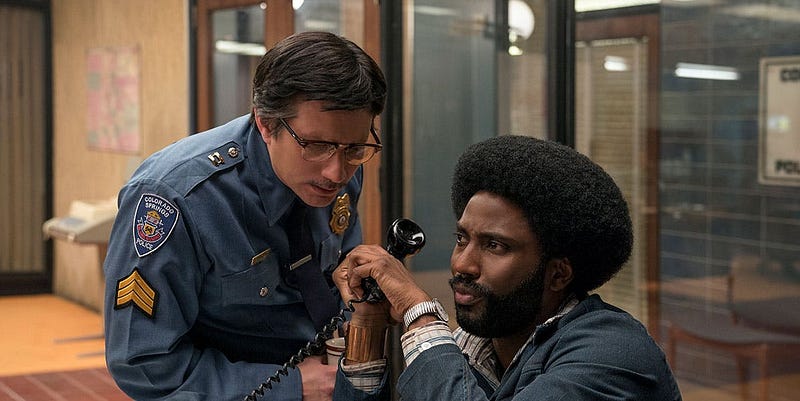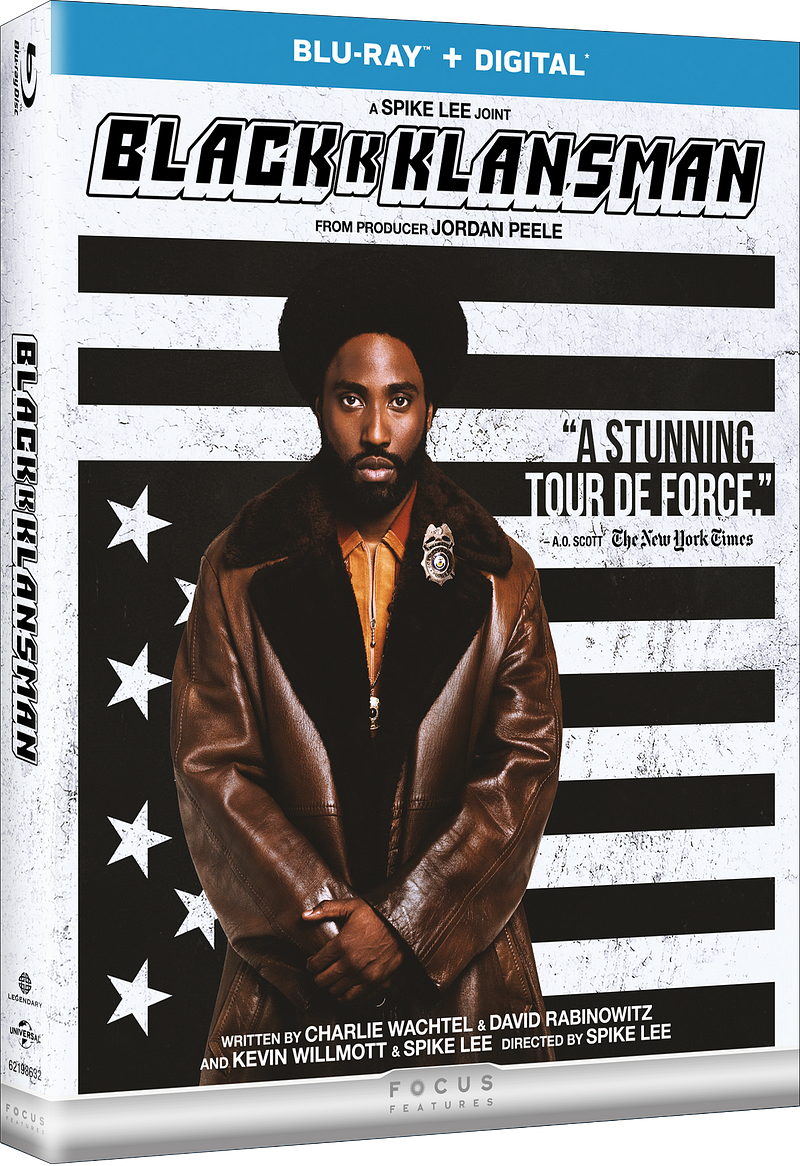Spike Lee delivers a fiery look at the past, and potent warning for the present

We live in tumultuous times. Progress that has been made in various aspects of American society is threatened. Inalienable rights feel under threat. Regressive and outright racist personalities feel emboldened by the political environment, stoking division and their egregious acts. It’s an environment that inspires many, to stand up, to become active, and for many, to find a way to channel thoughts and fears through whatever medium they can. Enter Spike Lee, who so often in the past has captured the moment with a cinematic statement, and BlackkKlansman is one of his boldest yet. A timely and fierce project, it mines the past and the (mostly) true story of Ron Stallworth and his experience as a black detective dealing with social prejudice while finding himself investigating the KKK.
Synopsis:
From visionary filmmaker Spike Lee comes the incredible true story of an American hero. In the early 1970s Ron Stallworth (Washington) becomes the first African-American detective in the Colorado Springs Police Department. Determined to make a difference, he bravely sets out on a dangerous mission: infiltrate and expose the Ku Klux Klan. He recruits a seasoned colleague, Flip Zimmerman (Driver), into the undercover investigation. Together, they team up to take down the extremist organization aiming to garner mainstream appeal. BlacKkKlansman offers an unflinching, true-life examination of race relations in 1970s America that is just as relevant in today’s tumultuous world.

Strip away the commentary and context, and the film is a mismatched partner cop comedy. That’s the core of the film that makes it accessible and helps lower the defenses so that when the truth hits about this time and situation, it hits hard. The investigations see the pair out of their element in a situational comedy, only it’s a black man looking to impersonate a Neo-nazi over the phone, while a Jew does the same in person. There’s a level of absurdity to the whole thing despite the vein of truth to it all. Incredulity that a black man could end up in such a ludicrous position is compounded by the immersion of a Jewish man within the ranks of these bigoted people, providing insights into the casual hate on display. There is something truly impressive with how Lee balances the tonal shifts throughout the film. A hilarious (and egregiously racist) propaganda video from Alec Baldwin at the open sets you up for what to expect in term of how funny the film can be at times, with visual jokes, observation comedy, and the fake identity of both Stallworth and Zimmerman getting milked for all it’s worth. The humor provides a balm to counter the rawness of some of the harder hitting moments, of which there are many: a glimpse of shooting targets used by the KKK, real news footage of protests and people rallying against injustice, or even the simple sight of sight of white men, adorned in white robes clinging to the Confederacy, taking perverted pride in hateful ideals.
John David Washington portrays Stallworth with a wry humor and attitude, to backup the dignity and determination of a man looking to do his job in the face of adversity, from society and indeed his own profession. Adam Driver continues to cultivate a hell of a resume, with another memorable turn, here a a character pivotal to drawing in segments of the audience that are less directly affected than some of the demographics portrayed onscreen. Jewish in heritage, it’s an aspect of his character he rarely considers, but one viewed with such hate by these KKK members on a par with skin color. As he is immersed within this group of people, his own heredity starts to bubble from within, his sense of unease is palpable, and he is forced to confront not just his own faith but his passive nature that has fed into the proliferation of these people.
Lee and co-screenwriters David Rabinowitz, Charlie Wachtel, and Kevin Wilmott do admirable work tying the tale to current events. How people can empower themselves and embolden weaker, less intelligent men (shout out to I, Tonya’s Paul Walter Hauser) by embracing lies. In current day we have things such as the birther conspiracy; here, things are more tilted towards conversations about physical or mental superiority. The person in question here is Grand Wizard David Duke (played with unsettling perfection by Topher Grace), and it is genuinely chilling seeing the grasp he has on folk, and the damage they can cause. Hearing cries of “America First!” and conversations of “making America great again” may to some feel forced, but in context the Klan got there first, and current political campaigns are merely recycling old material. It also leans directly into to more recent events including the foul “bad people on both sides” remarks after Charlottesville, something that provides the film with one of its more potent moments and strongest correlations between the era depicted and our own.
D.W. Griffith’s Birth of a Nation is often cited as a film cherished by people who embrace hate, and it’s a feature that gets reference and actual play within the film. In many ways BlackKKlansman feels like a counterpoint, a soulful, rousing affair to counter its hateful rhetoric. It’s clear Lee has something to say about the current state of affairs, and this film offers the perfect conduit for him to do just that. It crackles with energy and fire, is infused with the technical flair you expect from the director, and an impressive realization of ‘70s aesthetics, backed up by a smooth funk score from Terence Blanchard. BlackKKlansman deftly entertains with a incredible tale, but never loses sight of what it’s trying to say. It never lets up in its damnation of these views and how they have been not just allowed to persist, but flourish once again.

The Package
Here’s the good news about this release: it looks great. The texture and colors of the ‘70s are represented in style, with deep, natural tones and impressive detail. On the downside, extra features are pretty sparse, limited to:
- A Spike Lee Joint: Producer Jordan Peele, cast, and film subject Ron Stallworth discuss the unique experience of working with iconic director Spike Lee.
- BlacKkKlansman Extended Trailer Featuring Prince’s “Mary Don’t You Weep”
- Digital download code included
Having attended a screening of the film with Ron Stallworth in attendance for a Q&A, I know he has plenty of stories to tell, so it’s surprising the release doesn’t draw from that in a more in-depth documentary or audio commentary. The truth, richness, and relevance of the tale deserves better.

The Bottom Line
BlackkKlansman is the most impassioned project we’ve seen from Spike Lee in a long time. A provocative, fiery, and affecting piece of work, one that deftly takes a cop comedy and the sociopolitical strife of the ‘70s to deliver a potent wake-up call for today. Keep that revolution going brothers and sisters.

Blackkklansman is currently available on Digital, and will be available on Blu-ray, 4K Ultra and DVD November 6th, 2018.


